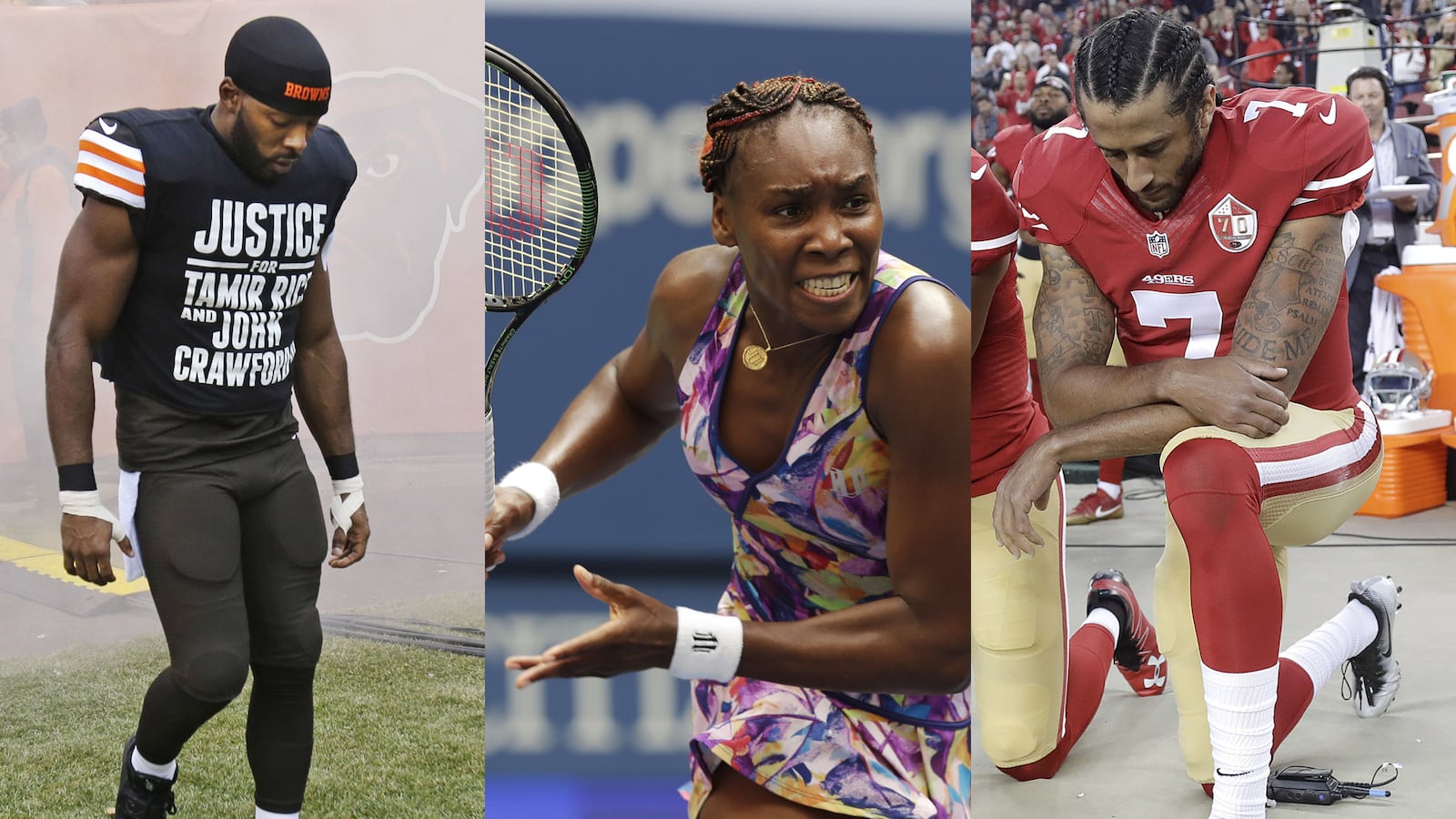Today, there is a new brand of black athlete. They’re courageous, high profile, and smarter than you think. These men and women are undoubtedly trendsetters who know how to use the power of their bodies to sell accessories. In our sports- and celebrity-obsessed culture, when these athletes wear tattoos, over-the-ear headphones, eyeglasses, sneakers, hats, and watches, they ensure these items get more play. They recognize their ability to influence.
But we are way beyond mere endorsements here. Increasingly, these athletes are using the power of their voices for change.
It hasn’t always been this way.
The outpouring for Muhammad Ali when he died obscured the extent to which many reviled him initially and how much he suffered professionally and financially for expressing his views. Similarly, the Olympic committee suspended John Carlos and Tommie Smith for their Black Power salute during the 1968 Olympics, and their careers met similar fates. High-profile athletes who followed, like Michael Jordan, Kobe Bryant, and Tiger Woods remained largely silent on political and social issues, focusing on pleasing sponsors. Times have changed.
Today’s telegenic, media-savvy athletes know how to dress for the camera, attract followings on social media, and use their platforms to express their views, defying perceptions many hold about them. It takes courage for athletes to speak up in a sports culture that values conformity. Yet they have fought for equal pay, spoken out against police abuse, mass incarceration, and other social issues that plague our nation, sometimes to the detriment of their marketability. Indeed, when it is safe to let one’s athletic feats stand as their bodies of work, it takes bravery to speak out. Social media and a 24-hour news cycle make the wrath they receive immediate, pronounced, and sustained. Yet athletes of conscience advance the dialogue and move people to action, all while looking great and in control.
Many athletes are taking public stands to highlight important issues, but below are three who deserve special commendation for their actions. They have pursued justice and withstood sometimes withering criticism for their efforts.
Venus Williams
Venus and her sister Serena have done more than any female athletes to raise tennis’s profile and the visibility of women as athletes. Venus led the push for equal pay at the grand slams (the Australian, French, and U.S. Opens and Wimbledon), even as her peers demurred. Wimbledon was the last grand slam to offer equal pay. Conversely, it is also the event where Venus has enjoyed the most success, winning the title five times and finishing as the runner up three times. How fitting it was then, that she was the first female recipient of equal prize money when she won in 2007, the same as Roger Federer for his title. She followed it up with another title 2008, looking stunning in her self-designed dress from her company, EleVen.
Andrew Hawkins
In 2014, Cleveland Browns wide receiver Andrew Hawkins wore a “Justice for Tamir Rice” shirt onto the football field to protest the shooting death of 12-year-old Rice by the Cleveland police while playing with a toy gun in a park. The Cleveland police union strongly protested, suggested that Hawkins stick to what he knows—which presumably was not law enforcement—and threatened to withhold security services for the team. When Hawkins appeared for his press conference after the game, his look was urban sophisticate suggesting careful consideration to his styling detail with his fedora, down jacket over his hooded sweatshirt, close-cropped beard, and goatee. Hawkins’s eloquent, emotional defense of his actions and assertion of his right to protest was truly memorable and won him many admirers. It is clear that many were not prepared for his response and it was extremely effective because of his poise and presence.
Colin Kaepernick
More recently, San Francisco 49ers quarterback Kaepernick decided not to stand during the National Anthem to protest police misconduct. The reaction was swift; Kaepernick was vilified and received death threats. Like Hawkins, Kaepernick deftly fielded questions from the press that caught some off guard who expected him to be ill informed. For a man of chameleon hair and styles Kaepernick’s afro, representing the ultimate symbol of black rebellion, underscored his protest. Kaepernick’s actions have gained support from veterans and other professional, college, and high school students and athletes. Sadly, the spate of shootings since his public stance seems to validate his position.
Athletes have an unprecedented ability to influence fashion, pop culture, and politics with their actions. It is refreshing to see many of them acting on their convictions, continuing in the tradition of Harry Belafonte, who says black athletes have never been more visible and that they have an imperative to speak for those who don’t have a voice. Here’s to them doing their thing and looking good while doing it.






